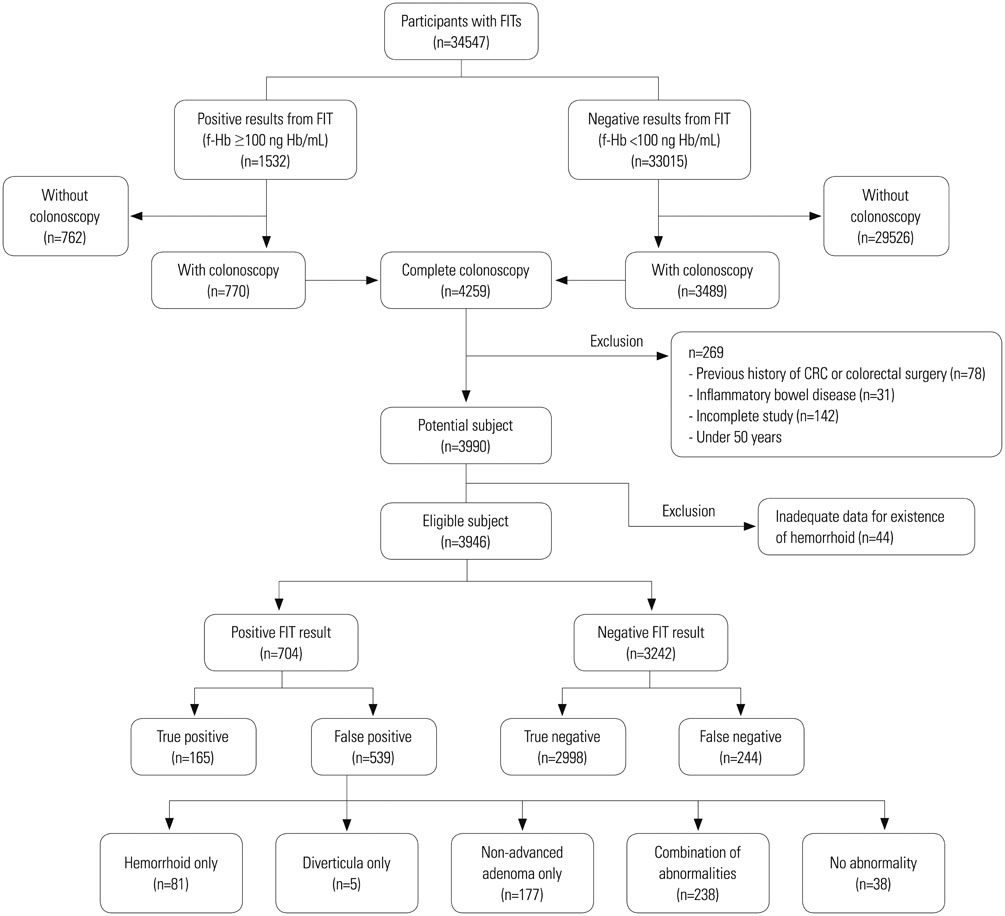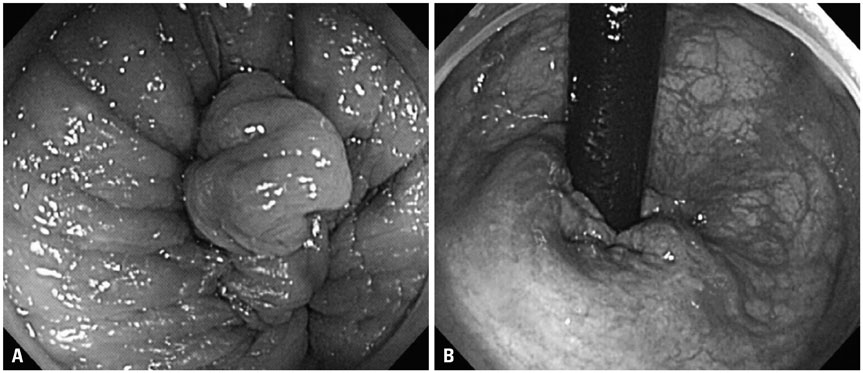Yonsei Med J.
2017 Jan;58(1):150-157. 10.3349/ymj.2017.58.1.150.
Are Hemorrhoids Associated with False-Positive Fecal Immunochemical Test Results?
- Affiliations
-
- 1Division of Gastroenterology, Department of Internal Medicine, Kangbuk Samsung Hospital, Sungkyunkwan University School of Medicine, Seoul, Korea. ys810.jung@samsung.com
- KMID: 2374201
- DOI: http://doi.org/10.3349/ymj.2017.58.1.150
Abstract
- PURPOSE
False-positive (FP) results of fecal immunochemical tests (FITs) conducted in colorectal cancer (CRC) screening could lead to performing unnecessary colonoscopies. Hemorrhoids are a possible cause of FP FIT results; however, studies on this topic are extremely rare. We investigated whether hemorrhoids are associated with FP FIT results.
MATERIALS AND METHODS
A retrospective study was conducted at a university hospital in Korea from June 2013 to May 2015. Of the 34547 individuals who underwent FITs, 3946 aged ≥50 years who underwent colonoscopies were analyzed. Logistic regression analysis was performed to determine factors associated with FP FIT results.
RESULTS
Among 3946 participants, 704 (17.8%) showed positive FIT results and 1303 (33.0%) had hemorrhoids. Of the 704 participants with positive FIT results, 165 had advanced colorectal neoplasia (ACRN) and 539 had no ACRN (FP results). Of the 1303 participants with hemorrhoids, 291 showed FP results, of whom 81 showed FP results because of hemorrhoids only. Participants with hemorrhoids had a higher rate of FP results than those without hemorrhoids (291/1176, 24.7% vs. 248/2361, 10.5%; p<0.001). Additionally, the participants with hemorrhoids as the only abnormality had a higher rate of FP results than those experiencing no such abnormalities (81/531, 15.3% vs. 38/1173, 3.2%; p<0.001). In multivariate analysis, the presence of hemorrhoids was identified as an independent predictor of FP results (adjusted odds ratio, 2.76; 95% confidence interval, 2.24-3.40; p<0.001).
CONCLUSION
Hemorrhoids are significantly associated with FP FIT results. Their presence seemed to be a non-negligible contributor of FP results in FIT-based CRC screening programs.
MeSH Terms
Figure
Reference
-
1. Lin OS, Kozarek RA, Cha JM. Impact of sigmoidoscopy and colonoscopy on colorectal cancer incidence and mortality: an evidence-based review of published prospective and retrospective studies. Intest Res. 2014; 12:268–274.
Article2. Lee HS, Jeon SW. Is retroflexion helpful in detecting adenomas in the right colon?: a single center interim analysis. Intest Res. 2015; 13:326–331.
Article3. Inra JA, Syngal S. Colorectal cancer in young adults. Dig Dis Sci. 2015; 60:722–733.
Article4. Kim YH, Noh R, Cho SY, Park SJ, Jeon SM, Shin HD, et al. Inhibitory effect of metformin therapy on the incidence of colorectal advanced adenomas in patients with diabetes. Intest Res. 2015; 13:145–152.
Article5. Kwon MJ, Kim YS, Bae SI, Park YI, Lee KJ, Min JH, et al. Risk factors for delayed post-polypectomy bleeding. Intest Res. 2015; 13:160–165.
Article6. Carroll MR, Seaman HE, Halloran SP. Tests and investigations for colorectal cancer screening. Clin Biochem. 2014; 47:921–939.
Article7. de Wijkerslooth TR, Stoop EM, Bossuyt PM, Meijer GA, van Ballegooijen M, van Roon AH, et al. Immunochemical fecal occult blood testing is equally sensitive for proximal and distal advanced neoplasia. Am J Gastroenterol. 2012; 107:1570–1578.
Article8. Chiang TH, Lee YC, Tu CH, Chiu HM, Wu MS. Performance of the immunochemical fecal occult blood test in predicting lesions in the lower gastrointestinal tract. CMAJ. 2011; 183:1474–1481.
Article9. Levi Z, Rozen P, Hazazi R, Vilkin A, Waked A, Maoz E, et al. A quantitative immunochemical fecal occult blood test for colorectal neoplasia. Ann Intern Med. 2007; 146:244–255.
Article10. van Rossum LG, van Rijn AF, Laheij RJ, van Oijen MG, Fockens P, van Krieken HH, et al. Random comparison of guaiac and immunochemical fecal occult blood tests for colorectal cancer in a screening population. Gastroenterology. 2008; 135:82–90.
Article11. Park DI, Ryu S, Kim YH, Lee SH, Lee CK, Eun CS, et al. Comparison of guaiac-based and quantitative immunochemical fecal occult blood testing in a population at average risk undergoing colorectal cancer screening. Am J Gastroenterol. 2010; 105:2017–2025.
Article12. van Turenhout ST, Oort FA, Terhaar sive Droste JS, Coupé VM, van der Hulst RW, Loffeld RJ, et al. Hemorrhoids detected at colonoscopy: an infrequent cause of false-positive fecal immunochemical test results. Gastrointest Endosc. 2012; 76:136–143.
Article13. Stegeman I, de Wijkerslooth TR, Stoop EM, van Leerdam M, van Ballegooijen M, Kraaijenhagen RA, et al. Risk factors for false positive and for false negative test results in screening with fecal occult blood testing. Int J Cancer. 2013; 133:2408–2414.
Article14. Wen CP, David Cheng TY, Tsai SP, Chan HT, Hsu HL, Hsu CC, et al. Are Asians at greater mortality risks for being overweight than Caucasians? Redefining obesity for Asians. Public Health Nutr. 2009; 12:497–506.
Article15. Grundy SM, Cleeman JI, Daniels SR, Donato KA, Eckel RH, Franklin BA, et al. Diagnosis and management of the metabolic syndrome: an American Heart Association/National Heart, Lung, and Blood Institute Scientific Statement. Circulation. 2005; 112:2735–2752.16. Fraser CG, Allison JE, Halloran SP, Young GP. Expert Working Group on Fecal Immunochemical Tests for Hemoglobin. Colorectal Cancer Screening Committee. World Endoscopy Organization. A proposal to standardize reporting units for fecal immunochemical tests for hemoglobin. J Natl Cancer Inst. 2012; 104:810–814.
Article17. Lai EJ, Calderwood AH, Doros G, Fix OK, Jacobson BC. The Boston bowel preparation scale: a valid and reliable instrument for colonoscopy-oriented research. Gastrointest Endosc. 2009; 69(3 Pt 2):620–625.
Article18. Sun Z, Migaly J. Review of hemorrhoid disease: presentation and management. Clin Colon Rectal Surg. 2016; 29:22–29.19. Lieberman DA, Rex DK, Winawer SJ, Giardiello FM, Johnson DA, Levin TR, et al. Guidelines for colonoscopy surveillance after screening and polypectomy: a consensus update by the US Multi-Society Task Force on Colorectal Cancer. Gastroenterology. 2012; 143:844–857.
Article20. Rockey DC. Occult gastrointestinal bleeding. N Engl J Med. 1999; 341:38–46.
Article21. Saito H. Screening for colorectal cancer by immunochemical fecal occult blood testing. Jpn J Cancer Res. 1996; 87:1011–1024.
Article22. Rockey DC, Auslander A, Greenberg PD. Detection of upper gastrointestinal blood with fecal occult blood tests. Am J Gastroenterol. 1999; 94:344–350.
Article23. Denters MJ, Deutekom M, Essink-Bot ML, Bossuyt PM, Fockens P, Dekker E. FIT false-positives in colorectal cancer screening experience psychological distress up to 6 weeks after colonoscopy. Support Care Cancer. 2013; 21:2809–2815.
Article24. McCann J, Stockton D, Godward S. Impact of false-positive mammography on subsequent screening attendance and risk of cancer. Breast Cancer Res. 2002; 4:R11.
Article25. Nakama H, Kamijo N, Fujimori K, Horiuchi A, Abdul Fattah S, Zhang B. Immunochemical fecal occult blood test is not suitable for diagnosis of hemorrhoids. Am J Med. 1997; 102:551–554.
Article26. Johanson JF, Sonnenberg A. The prevalence of hemorrhoids and chronic constipation. An epidemiologic study. Gastroenterology. 1990; 98:380–386.
Article27. Haug U, Knudsen AB, Kuntz KM. How should individuals with a false-positive fecal occult blood test for colorectal cancer be managed? A decision analysis. Int J Cancer. 2012; 131:2094–2102.
Article28. Lee TJ, Hull MA, Rajasekhar PT, Clifford GM, Ritchie M, James P, et al. Aspirin users attending for NHS bowel cancer screening have less colorectal neoplasia: chemoprevention or false-positive faecal occult blood testing? Digestion. 2012; 85:278–281.
Article
- Full Text Links
- Actions
-
Cited
- CITED
-
- Close
- Share
- Similar articles
-
- Usefulness of fecal immunochemical test and fecal calprotectin for detection of active ulcerative colitis
- Single Immunochemical Fecal Occult Blood Test for Detection of Colorectal Neoplasia
- Budget Impact of the Accreditation Program for Clinical Laboratories on Colorectal Cancer Screening via Fecal Immunochemical Testing: Results from the National Cancer Screening Program in Korea
- Screening Test for Colorectal Cancer: Colonoscopy and Fecal Immunochemical Test
- Comment on " Positive fecal immunochemical test results are associated with non-colorectal cancer mortality"



